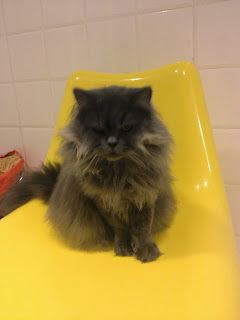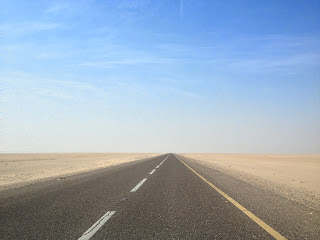Every November since we have been living in Kuwait, we join the Amicale des Français au Koweït (that's the local association for French-speaking expats) for a night in the desert. We meet up at 1 in the afternoon at an agreed-upon place, someone hands us a map and GPS coordinates, and we head out in a convoy to a corner of Kuwait where there is nothing but sand and the odd herd of camels.
Some observations about the desert in Kuwait. First of all, it's almost completely flat.
It's nothing like the beautiful vast rolling dunes that you see in the United Arab Emirates, for example.
The flatness makes finding a campsite all the harder, because you really do need dunes to camp out. Dunes make camping a better experience, more beautiful, less windy, easier to find a private spot when you want to go pee! There are a couple of places where you can find a sand dune or two, fortunately, but they're rare.
Seconlyly, the sand of the Kuwait desert isn't consistently smooth and fine. In many parts, its more like gravel. There are plenty of stones and even large rocks to be found in it.
And then there is the garbage. It's a sad fact that there is trash everywhere you look in the desert of Kuwait. It litters almost every square meter of sand. We are guessing that there is no or limited trash collection for the bedouins who live in the desert. That might be one part of the problem. However, I also sense that people in Kuwait have not developed the common value of caring for their communal environment. The desert doesn't belong to any one person individually but to the whole country, so it's not up to any one person to keep it clean. It's sad because, even without the dunes, it could be a beautiful desert. As it stands, it can be truly ugly just because of all the trash.



The camp is only an hour and 15 minutes away (Kuwait is a tiny country!). Once we arrive, we have to set up our tent right away, before it gets dark. Pitching a tent can be an arduous task in normal conditions. It's really hard when you have a strong wind, and sand blowing in your face while you're doing it. We end up getting help from a few people to set up our tent, plus several bags of sand and rocks to prevent the tent from blowing away when we aren't in it.

Once the tents are pitched, it's time for the aperatif. Everyone gets beverages out of their coolers (I'm not going to mention what kind of beverages people brought with them. I'll leave that up to your imagination). We drink to good health and the expat life. The Crown Plaza Hotal has already arrived with the catering truck, and an hour later, there are tables and chairs set up and a buffet dinner is served. We have a lively dinner filled with banter, jokes, and camraderie. The kids hardly eat anything. They're too busy rolling down the sand dunes and exploring dark places for snakes and lizards.
After dinner, it's time for singing around a big bonfire.
Somewhere around 11PM, we make it to our tents and fall asleep. This may seem early to you, but it's been dark since 5PM and we're exhausted.
In the morning, we wake up with the sun and the sound of wind. Sand covers every crevice of our tent and every orifice of our body. After a communal breakfast of coffee and packaged croissants, we take down our tents and pick up any garbage on the ground. We think it's important to clean up after ourselves.
We can't wait to get home, take a shower, and appreciate the new-found luxury of our homes. The desert is fun for a night but not longer than that.
















































